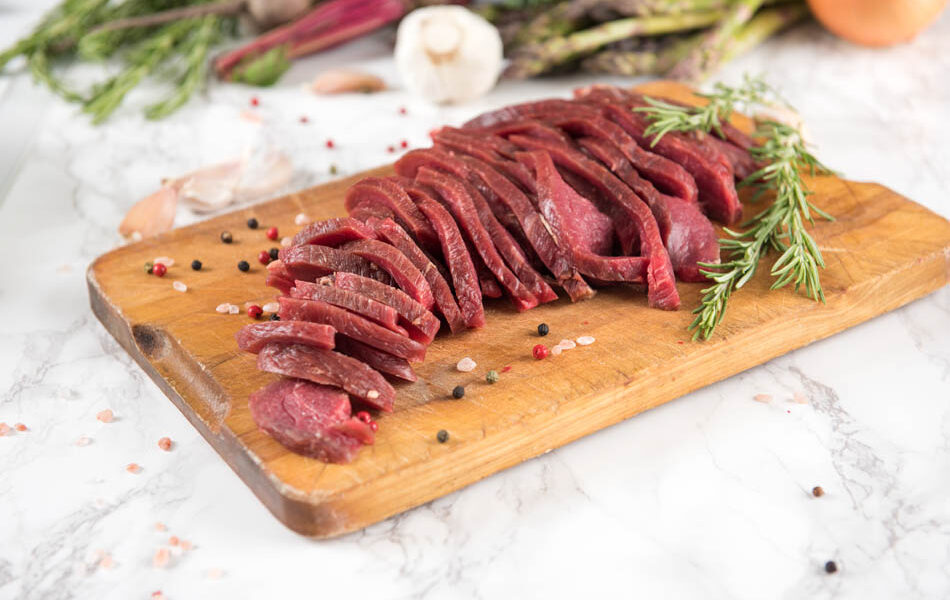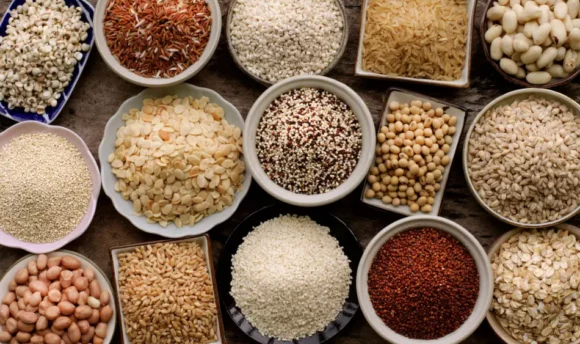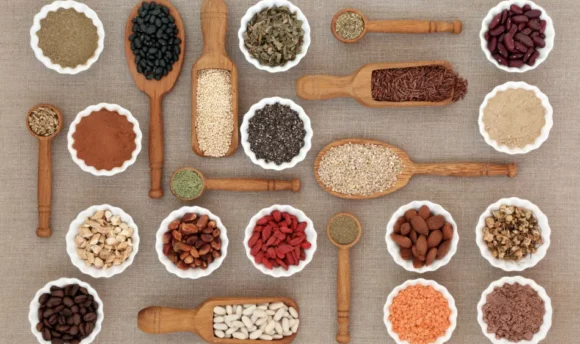Is Bison Healthy? Benefits, Nutrition and Cholesterol
With a reputation that bison is healthier than regular beef or pork, this article will unpack the benefits, downsides, and nutritional considerations of eating bison. Read on!

Touting the flavor of beef with fewer health side effects, bison is a popular type of meat that many enjoy as a burger, bison steaks, or ground bison as taco meat. However, is bison really better than beef? Can it be a part of a healthy and balanced diet?
From the nutritional differences between bison and beef, the benefits of bison, and more, let’s dive into more information on the nutritional profile of bison.
Is Bison Healthy?
Bison is a healthier meat that is lower in calories and fat compared to other red meats but still provides significant amounts of protein, iron, B vitamins, such as vitamin B12, and more.
Which Is Better: Bison or Beef?
Some key differences between beef and bison are the calorie content, fat composition, and grams of protein.
Beef is slightly higher in calories and fat and a bit lower in protein when compared to bison.
For reference, according to the United States Department of Agriculture (USDA) Food Data database, a 100g serving of beef has 52 more calories, 5.5 more grams of total fat, and practically double the amount of saturated fatty acids compared to a 100g serving of bison.
Therefore, while the caloric differences between bison and beef are slight, beef is significantly higher in total fat and saturated fat than bison.
However, bison has just slightly more protein than beef as well.
All of these factors combined make bison healthier than beef and other types of meat.
3 Health Benefits of Bison
While eating bison has many health benefits, let’s cover some of the key players. Read on to learn more!
#1 Free of carbohydrates
Bison meat is essentially carbohydrate-free, as most meats are. Therefore, for individuals who have diabetes and need to monitor their carbohydrate intake, meats are a great and nourishing food they do not need to worry as much about.
However, carbohydrates are the body’s primary source of energy. So, it is essential to pair your bison with starch, preferably a whole grain. For example, a bison burger on a wheat bun, bison paired with brown rice, or bison with whole-grain pasta.
The combination of protein, whole grains, and a healthy fat source (such as a tablespoon of extra virgin olive oil) is the perfect pairing to feel full and satisfied after eating and for a few hours until the next meal.
#2 Rich in the antioxidant selenium
Additionally, a 100g serving of bison contains 20mg of selenium. Selenium is a mineral with antioxidant characteristics that benefit our health.
Overall, antioxidants are compounds in many foods we eat that fight against harmful free radicals in the body. Free radicals can contribute to inflammation and oxidative stress.
However, eating a diet rich in antioxidants can combat inflammation and oxidative stress in the body.
According to Harvard, research is also being conducted on the potential benefits of selenium on the immune system and how the mineral can benefit immunity and system functioning.
#3 Low in sodium
Another benefit of bison is that it is relatively low in sodium, with only 70mg of salt per 100g serving.
The American Heart Association recommends consuming no more than 2,300mg of sodium daily. However, consuming less than 1,500mg is even more ideal for heart health.
Consuming too much sodium can lead to high blood pressure and increase the risk of chronic heart diseases, such as heart attack and stroke.
Therefore, bison is a good protein option that is low in sodium. Additionally, making your own bison dishes, such as bison burgers, at home allows you to control precisely how much salt is added to your food and make your bison healthier.
Ground Bison Nutritional Value
Now that we’ve discussed the primary health benefits of bison, let’s talk about the nutritional information of a serving of ground bison.
Nutrition table (per 100g)
| Calories/Nutrient (per 100g) | Amount |
| Calories (kcal) | 146 |
| Sodium (mg) | 70 |
| Net Carbs (g) | 0.05 |
| Fiber (g) | 0 |
| Sugar (g) | 0 |
| Total Fats (g) | 7.21 |
| Protein (g) | 20.2 |
| Cholesterol (mg) | 55 |
Source: https://fdc.nal.usda.gov/fdc-app.html#/food-details/175293/nutrients
Low in calories and fats
A 100g serving of bison (which is just over 3oz of meat) contains a mere 146 calories. Therefore, bison is an excellent low-calorie option for those looking to lose weight.
Additionally, 100g of bison contains 7g of total fat and just under 3g of saturated fat.
The American Heart Association recommends consuming no more than 5–6% of your calories through saturated fat. So, for example, if you need to eat about 2,000 calories per day, no more than 120 calories a day should be from saturated fat.
A 100g serving of bison contains less saturated fatty acids compared to beef. In other words, 100g of bison is close to a quarter of the recommended daily amount, while the same beef serving has more than half of your daily saturated fat.
Too much saturated fat in the diet can contribute to high cholesterol and increase your risk of heart diseases, such as stroke or heart attack.
High in protein
Bison is especially high in protein, even higher than the protein content of beef. A 100g serving of bison contains 20.2g of protein.
Protein recommendations vary from person to person depending on age, height, weight, physical activity levels, and disease states. However, in most cases, 20g of protein is considered high and is beneficial to muscle growth and development.
Protein is made from essential amino acids, which play a primary role in every chemical reaction in the body, and, therefore, it is needed to sustain human life.
High in vitamins and minerals
Bison is rich in many vitamins and minerals, including iron, potassium, and B vitamins, such as vitamin B12.
Iron is a mineral that is essential for blood health and helps red blood cells carry oxygen through the body to cells that need oxygen to function. Meanwhile, potassium is an electrolyte that works alongside sodium for fluid balance in the body.
Additionally, bison is a source of phosphorus, zinc, magnesium, B vitamins, and more!
A moderate amount of cholesterol
A 100g serving of bison, which is just over 3oz of meat, contains 55mg of cholesterol. Cholesterol is found in all animal products, including poultry, fish, and dairy products, such as milk, cheese, and yogurt.
While 55mg of cholesterol is relatively low or moderate, the 2020–2025 Dietary Guidelines for Americans recommends consuming as little dietary cholesterol as possible.
Healthy Bison Recipe
So, we’ve established that bison is a healthier alternative to beef, but does it taste good? Yes!
Let’s discuss an easy and healthy bison recipe to get the most nutrition from this flavorful meat.
This bison burger recipe yields 4 servings.
Ingredients:
2 pounds of ground bison (preferably grass-fed)
4 whole-wheat hamburger buns
2 tsp of garlic powder
1 tsp of onion powder
1/4 tsp of cayenne pepper (optional)
2 tbsp of Worcestershire sauce
2 tbsp of olive oil
Preparation:
1. Start by combining the grass-fed ground bison meat with the spices and the Worcestershire sauce.
2. Form into 4 evenly sized patties.
3. Using your finger or a spoon, make an indent in the center of the burger to ensure that the center of the patty gets cooked well.
4. Place patties on a skillet that has been greased with olive oil and is on moderate heat.
It is important to note that since bison is so lean, it should be cooked in a skillet under moderate heat rather than on a hot grill to avoid overcooking.
5. Cook the patties until they are cooked well done. Remove any visible fat that can be seen on the burgers.
The USDA recommends cooking ground meat to a minimum of 160ºF or 71.1ºC. Use a stem thermometer and check the temperature of the burger at the thickest point, which is typically the center.
6. Serve on a whole-wheat bun with your favorite burger toppings, such as lettuce, tomato, onion, and pickles. Enjoy!
If you want to check more healthy recipes, we would recommend the DoFasting app with more than 5,000+ healthy recipes.

- 5,000+ healthy recipes
- Healthy desserts
- Improved eating habits
- Calorie tracker to track daily caloric intake
- Full guidance on successful diet
FAQs
Bison meat is lean, with only 7.21g of total fat and 2.92g of saturated fat in a 100g serving. However, it is not as lean as poultry or fish.
Yes, bison meat has about 7g of total fat, while the same serving size amount of beef contains almost 13g.
Yes, bison meat is a type of healthier red meat. However, it should still be consumed no more than 3 times a week as part of a healthy diet.
Yes, bison meat is typically more expensive than beef and other meat products, depending on the current market price. This is especially true for grass-fed bison.
A Word From a Nutritionist
Overall, bison can be a great alternative to beef if you are looking to have red meat but do not want all of the calories and saturated fat.
Bison meat is excellent for a burger patty, crunchy tacos, and more. The options are endless.
Nevertheless, it is essential to remember that too much bison meat can still contribute to health issues because it contains some fat, sodium, and cholesterol.
It is better for you than beef, but chicken, fish, or non-meat protein sources are even more nutritious. The American Institute for Cancer Research recommends no more than three servings of red meat each week.
For the rest of your meals throughout the week, focus on plant-based protein, poultry, and fish.
Conclusion
In conclusion, bison meat is leaner than beef in terms of total fat and, more specifically, saturated fat.
Bison meat is a healthier alternative to beef. However, bison is still a type of red meat. Therefore, it still contains moderate amounts of cholesterol and fat, especially when compared to poultry, fish, or vegetarian protein sources, such as tofu or seitan.
Therefore, stick with the recommendation to consume no more than three portions (about 3–4oz portions) of red meat each week, including bison.

















































 Select your language:
Select your language: 








